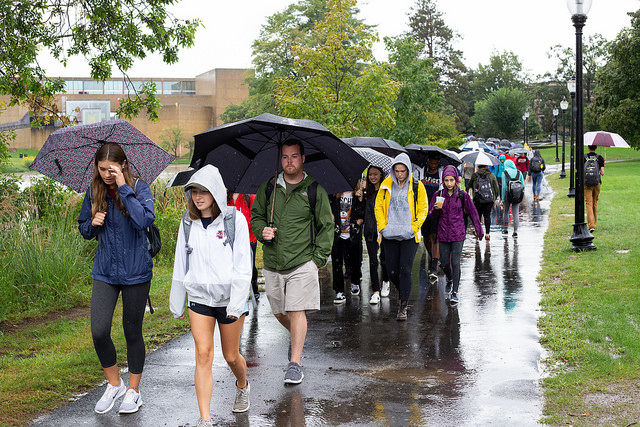Believe it or not, you live in a bubble. This proverbial bubble pertains to your knowledge of events outside the United States. In your bubble, life is perfect and everything is going smoothly to an extent. You don’t see the outside world beyond the United States borders. The news only produces stories that are either United States-based or somehow involve the United States. It’s not your fault either. You didn’t choose to live in a bubble, but the education system unintentionally put you into one.
The common core is only designed to give the average American student a general idea of world history and an in-depth look into United States History. According to the “Massachusetts History and Social Science Curriculum Frameworks,” the state only requires that each student takes two units of world history and two units of United States history, and depending on the school district, no student receives the same history experience. These frameworks only specify that a student needs to know how to analyze certain texts and develop arguments in order to graduate. Yes, those skills could be applicable to real life, but in reality it seems the only purpose of history is to teach said skills, not to understand history as whole and learn from our mistakes. The average student only gets a glimpse about the history in Africa that led to the current genocides and conflicts and solely focused on European history. All history is important, but there were portions of history that felt neglected, like missing pieces in the history puzzle.
But there is one region of history that the most students have been ‘bubbled up’ to: genocides around the world. No student is going to just know about the mass human atrocities in other countries unless someone spends time to teach it. The education system does not have time to mention the major genocides of the twentieth century, let alone the ones currently happening and the study of modern events. Most students only get to World War II in their historical studies.
To discover how much first-year students knew about twentieth century genocides, I asked a series of questions to students in Crabtree Hall in the Northeast Residential Area in an informal survey. The questions started out simple. I asked if they knew what a genocide was. All the students knew the definition. Secondly, students were asked if they knew about any of the genocides that occurred within the twentieth century, and certain groups were able to name one or two (besides the Holocaust), like the Armenian Genocide or the Cambodian Genocide. Next, the groups were asked if they knew about and or could name any of the current genocides. Students could only take guesses of how many there were but couldn’t name any, and some didn’t think there were any genocides happening. When told that there were five genocides occurring, a state of shock and awe came over the interviewees. Finally, after being presented the information in such quick interview, all the students I interviewed could agree that they, in some way, shape or form, did indeed live in a bubble.
Students like Emma Busch, a psychology major, and social and behavioral sciences student Catherine DiGiammarino both agreed that they lived in bubble. Busch stated that “I try to be educated to the best of my ability, but yeah, I definitely think we live in a bubble. I live in the Bethesda Bubble.” DiGiammarino, coming from that same area, argued, “I feel like America itself lives in a bubble.” Both are totally right that there is this a hypothetical bubble placed, and the news only shows so much. This goes along with the notion that if the US isn’t involved, then it isn’t newsworthy. Engineering major Jackson Dooley said, “I’ve read about them, but it wasn’t in the [mainstream] news.”
If there is someone willing to put in the countless of hours of hard work to develop a class format, it makes a world of a difference. Someone who would be devoted as Susan Harvey (‘Mama Harve’ as she was referred to by her students) who currently teaches at Littleton High School in Littleton, Massachusetts. I attended her course called “Facing History in Ourselves,” which introduces the major genocides of the world and the patterns of human behavior. The effort Harvey puts into the class leaves a lasting impact on her students for years to come.
Harvey teaches about the ‘Universe of Obligation,’ where an organizer is split up into three concentric circles, each circle growing in size. The circles are to represent how much you care about certain groups, putting them in their respective circle. At first, none of the students put any of the ethnic groups that were under attack in their circles. They put family members and friends in the inner circles, general topics like school and sports in the more outer circles. But after the 9-month course, students put groups such as the Rwandans, the Bosnians or the Darfuris. They also put people who helped aid the victims and put a stop to the genocides in their circles. This significantly changed the students expanded world view of who they would include in their circles.
Harvey popped the bubble. She opened the eyes for her students to a ‘not so picturesque’ world as they imagined. The small act of teaching a class devoted to learning about genocides produces educated citizens and future upstanders.
Nicole Biagioni is a Collegian columnist and can be reached at [email protected].




















Gloria • Oct 28, 2018 at 12:39 pm
Great article!
Keep them coming Nicole
Jimmy Svaramucci • Oct 24, 2018 at 11:39 pm
I definitely live in a bubble. This article is very enlightening .
Good job Nicole!
All the Best,
Jimmy